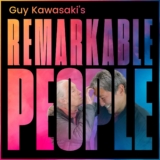In a world seemingly obsessed with financial success, what does it truly mean to be wealthy? And what if the path to a more meaningful life has less to do with ...
The $13T U.S. mortgage market serves 50M homeowners but still runs on decades-old software. In this episode, a16z GP Angela Strange hosts Tim Mayopoulos ...
What if you could turn a teenage sports annoyance into a $100k business while juggling school, sports, and everything else that comes with being 15? Harrison ...
In this Huberman Lab Essentials episode, I discuss science-supported nutrients that directly support brain structure, function and long-term cognitive health. ...
Scott speaks with Dr. Jessica Knurick, nutrition scientist and registered dietitian, about the rise of the Make America Healthy Again movement. They discuss ...
Ray Dalio turned $5 into $160 billion by decoding how empires rise and fall. Now he warns: America is in decline, the UK is in trouble, China is gaining ...
Shashank Samala is the CEO and co-founder of Heirloom, a carbon capture start-up. His problem is this: Can you use crushed up rocks to permanently suck carbon ...
Want to start your own million-dollar biz with less than $1k? Get the guide: https://clickhubspot.com/rko Episode 743: Sam Parr ( https://x.com/theSamParr ) ...
Why do some consumer products explode into networks that reshape the internet, while others fade away? Today on the podcast, a16z general partners Anish ...
What happens when one man reshapes movies, television, e-commerce, and tech—then tells you exactly how he did it, flaws and all? That’s Barry Diller. From ...
The GOP-led House Oversight Committee released Epstein’s “birthday book” in full… and it’s real gross. Scott and Jessica unpack the shocking revelations, and ...
Listen as two leading researchers at the cutting edge of computational biology explore breakthrough GPU accelerations that are changing how we understand ...
- « Previous Page
- 1
- …
- 21
- 22
- 23
- 24
- 25
- …
- 574
- Next Page »





